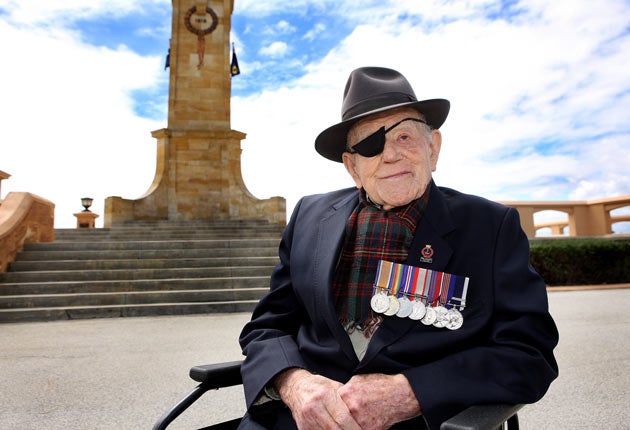Claude Choules is dead. Long live the Great War
DJ Taylor says the conflict will live in our memories despite the loss of its last veteran

The shadow of the Great War still hangs over half the households in England, 93 years after it ended. Looking back at my own family history, I can offer a grandfather invalided out after Passchendaele, Great-Uncle Walter, who never came back, and Great-Uncle Reg, who died after a bullet that lodged in his head started making its presence felt long years later. And the Mons Star still winks from my grandfather's row of medals, alongside the postcards sent back from the front. There must be hundreds of thousands of similar clusters the length and breadth of Britain.
Seen in this context, Claude Choules's death, at the ripe age of 110, is one of those intensely symbolic moments at which a human chain breaks, a line gets drawn under our perceptions of an historical event, and the observational powers brought to bear on it will henceforth labour under the fatal disadvantage of being second-hand. Like his distinguished predecessors Albert H Woolson (died 1956), the last Union veteran of the American Civil War, Edwin Hughes, the last survivor of the Balaclava (died 1927) and George Ives, final relic of the Boer War (died 1993), his passing takes on a figurative significance altogether dwarfing his individual achievements. Never again will an historian be able to ask the question, "What was the Great War like?" to a man who actually fought in it.
And yet, if Mr Choules's death is an intensely symbolic moment – still more so, in that he witnessed one of the Great War's defining operations, the surrender of the German Imperial Fleet – it is only that. The mythologising process brought to bear on 1914-18 began practically from the moment the Armistice was signed, even earlier, if you count the Great War poetry that is, in cultural terms, one of its most enduring legacies. Sometimes taking up its great figures, and sometimes casting them aside, this movement could produce perceptions of the conflict that were yards away from the historical reality.
Military historians are still debating the exact role played by General Douglas Haig, later Earl Haig, and the effect of his tactics on Allied casualties, but the popular impression of him remains that of "Butcher Haig" of the Blackadder caricature: a kind of futile half-wit who could send a battalion out to be slaughtered without turning a hair. Nine decades later it is possible to see the Great War as a gigantic filter, through which all kinds of national obsessions – class, Empire, patriotism – are endlessly refracted. Above all, there is its profound importance as a symbol of "Englishness", capable of informing everything from a literary novel to a rock album. To listen to PJ Harvey's new album, Let England Shake, for instance, is to uncover a chain of cross-references to Great War poets, bodies hanging on the wire, all seamlessly woven into the 21st-century national fabric.
And where does this leave Claude Choules, who was born shortly after the death of Queen Victoria and lived to see her great-great-great-great-grandson walk down the aisle of Westminster Abbey with his bride?
On paper, Mr Choules was merely a tiny cog in the wheels of a vast war-engine that took millions of men and women to their deaths. The intellectual refining process that works on great historical conflicts left him and his comrades behind decades ago. But the sight of him on television not long before his death, talking about the "happy life" he had left, had the average viewer on the edge of the seat: an extraordinary twitch on the historical thread and an unignorable nod in the direction of Flanders guns, churned mud, khaki hordes, all the things that are as much a part of our collective past as 'F.D.' on a penny or a Chelsea pensioner's scarlet coat.
Join our commenting forum
Join thought-provoking conversations, follow other Independent readers and see their replies
Comments